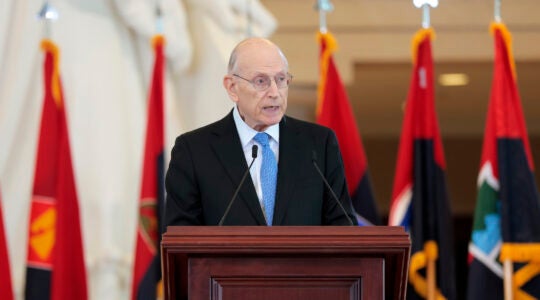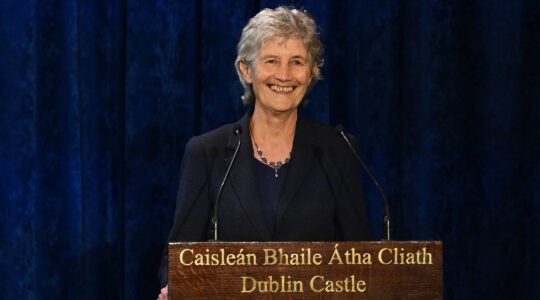ISTANBUL, Turkey (JTA) — As an American-led consensus appears to be developing around the need for a new round of sanctions to deal with Iran’s nuclear program, Turkey — a U.S. ally and NATO member — is emerging as something of a wild card on the issue.
Turkish Prime Minister Recep Tayyip Erdogan has dismissed accusations that Tehran wants to develop nuclear weapons as “rumors.” Also, in recent months he has focused attention on Israel’s undeclared nuclear arsenal, saying it should be examined as well if Iran’s nuclear program is being scrutinized.
Yet Turkey has its own concerns about the ambitions of Iran, a neighbor and regional rival.
“Turkey has been pursuing for the last six or seven years a foreign policy that would make it a regional power, and Iran is an obvious rival in that race,” said Fehmi Koru, a columnist with Yeni Safak, a liberal Islamic newspaper that is considered close to the government. “A nuclear Iran might be more powerful than Turkey, and I don’t think anyone in Ankara would like to see Iran as a nuclear power. But Iran is a close friend of Turkey and a neighbor that we haven’t had a quarrel with since the 1600s. It’s a delicate issue.”
Where Turkey stands exactly on Iran is a matter of some concern in the pro-sanctions camp.
Aside from its strategic importance to the West, Turkey currently is one of the 10 rotating members of the U.N. Security Council. Five “yes” votes are needed from the council’s rotating members to pass a new round of sanctions against Iran, making Turkey’s position critical.
Multiple, sometimes competing factors are at play when it comes to Turkey’s stance on Iran.
Relations between Iran and Turkey have improved dramatically in recent years. The ascendancy in 2002 of Turkey’s Islamic-rooted Justice and Development Party, or AKP, was a key turning point. The party has pledged to pursue a regional foreign policy of “zero problems” with its neighbors.
Trade between the two countries hit an estimated $10 billion in 2009, compared to $1 billion in 2000. Iran also supplies nearly one-third of Turkey’s gas supply. Turkish officials, meanwhile, were among the first and only world leaders to congratulate Iranian President Mahmoud Ahmedinejad after his controversial re-election last summer.
Koru says Erdogan has adopted the public posture of questioning Iran sanctions to keep the door open to the Iranian regime, so that Turkey can act as an interlocutor with the West. Erdogan is concerned, too, that sanctions on Iran would hit trade with Turkey particularly hard.
Other analysts see political motivations behind Erdogan’s public pronouncements on Iran’s nuclear program: By appearing to attack Israel and back Iran, Erdogan stands to benefit politically.
“This has become an opportunity for Erdogan to essentially play a role in the Middle East by attacking Israel,” said Henri Barkey, a Turkey expert at the Carnegie Endowment for International Peace in Washington. “It’s all part of the game to make Turkey the pre-eminent power in the region.”
At this week’s nuclear security summit in Washington, Erdogan again drew attention to Israel, whose relations with Turkey have been on the skids since Israel’s 2009 war with Hamas in Gaza.
“We don’t desire any nuclear proliferation in our region, and our policy is well known regardless of which country has such programs,” Erdogan told reporters before returning to Istanbul. “For us it doesn’t matter whether it is Israel or Iran. I will call on the international community, which is so sensitive toward Iran, to pay attention to Israel, too.”
Critics of Erdogan’s approach say the Turkish leader is playing a dangerous game.
“What Erdogan is doing is not contributing to his declared aim of a nuclear-free region,” said Semih Idiz, a foreign affairs columnist with the Turkish daily Milliyet. “What he is saying is being interpreted in the Middle East as that since Israel has weapons, why can’t others have them? The way he is approaching the thing, he’s also encouraging the weaponization of the Middle East.”
Barkey says the approach ultimately may strain Ankara’s relations with Washington, which would like to see Turkey deliver a tougher message to Tehran.
“I think the Americans are sick and tired of Turkey playing Iran’s lawyer and bashing Israel. Whatever Obama’s relations with Israel are, he doesn’t need this now,” Barkey said. “At some point there is going to be a bigger price here. It’s going to have an impact. It’s going to sour Turkish-American relations slowly, not because they are bashing Israel but because they are favoring Iran.”
Koru says that despite the public statements by Erdogan, Turkey has conveyed concerns to Iran about its suspected nuclear weapons program.
“Their policy is one of management rather than confrontation,” Barkey said.
In reality, political observers say, Turkey does not want to see a nuclear Iran or the unraveling of its relationship with Israel.
“I see no good news coming for Turkey from a continuing Iranian nuclear program,” said Ian Lesser, an expert on Turkey and Iran at the Washington-based German Marshall Fund, which promotes European-North American cooperation.
A nuclear-armed Iran, Lesser said, “will have implications for how groups under Iran’s umbrella, like Hezbollah or Hamas, will behave in the region, which may not be comfortable for Turkey,” he said. “I see a much more tense region with changing military balances that would not be in Turkey’s favor.”
JTA has documented Jewish history in real-time for over a century. Keep our journalism strong by joining us in supporting independent, award-winning reporting.





